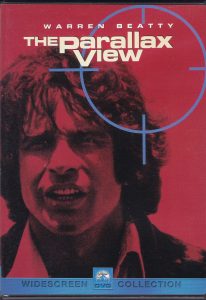Ye Olde Conspiracy Theory Movies: 1962’s The Manchurian Candidate, 1973’s The Day of the Jackal, 1965’s The Spy Who Came in from the Cold, all the other John Le Carre movies, and, to some extent even, the James Bond movies; long before Stone’s JFK and myriad others from the last five decades, spring to this cinephile’s long memory.
But a major turning point of nuance in this film genre certainly happened with Alan Pakula’s celebrated All the President’s Men (1976) and, before that, The Parallax View (1974). These two movies are literally and figuratively dark thanks to Gordon Willis’s cinematography and Pakula’s direction. The depth of presidential corruption we’re seeing today with Trump was definitely foreshadowed by Nixon, the Woodward-Bernstein classic book, and Pakula’s film on Nixon.
The Parallax View says to viewers: What does one really know about assassinations? How much can one know for certain? And, Who can one really trust? Especially when every potential situation may be deceptive or turn out to be a lie–the sort of endless morass Trump has unconscionably wrought upon America. Pakula’s movie compliments the cynicism about politics of the day per se reflected in other movies of the early-mid ’70s like The Candidate and Nashville.
Going back to view Parallax, I still found the sudden, surprising violence of the Seattle Needle rooftop deaths, the bar fight, the dam scene, the car chase, and the convention centre climax to work realistically and powerfully as seen today. The nonchalant, but inquisitive Joe (played by Warren Beatty) is a newspaper reporter who investigates a senator’s murder after Joe’s press reporter-friend is killed after she warns him of a conspiracy.
There are many strong supporting performances by the likes of Hume Cronyn, William Daniels, Paula Prentiss, and an uncredited Anthony Zerbe. But, best of all, there’s the ever-changing, suspenseful cinematography of Gordon Willis and the strange music of Michael Small that enhance the overall feel of this thriller. Indeed, much like President’s and 1971’s Klute, the movie could be described very much as a unique dark thriller emotionally, mentally, and spiritually. In some ways, it is the most exquisite and psychological realization of political evil ever shown on screen since the original Manchurian Candidate.
Seen today, The Parallax View with its moral of unending, bottomless evil, like the other three Pakulas and his 1990 Presumed Innocent, remains as relevant, upsetting, unsettling, and weirdly evil as ever.
Note: Willis also worked on Presumed, Coppola’s 3 Godfathers, and Woody Allen’s best films.

